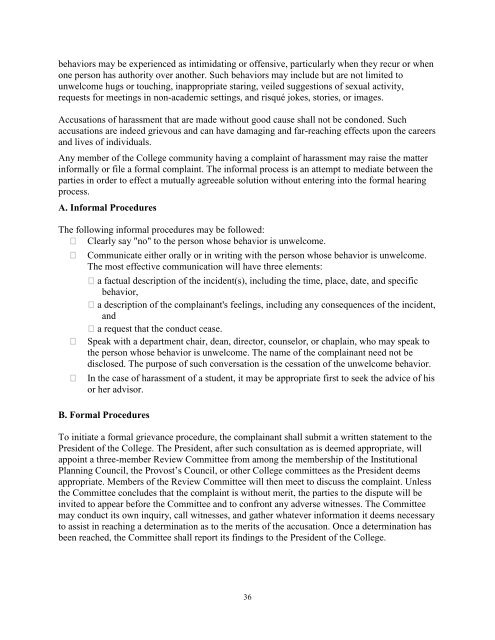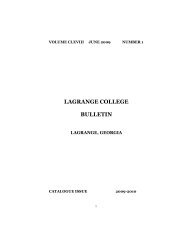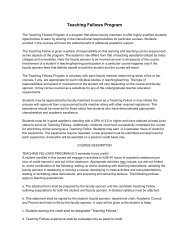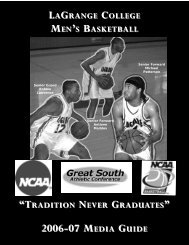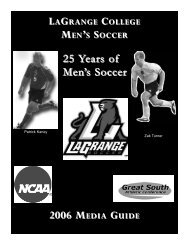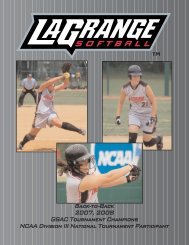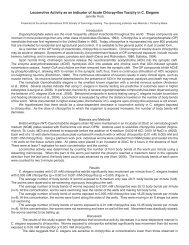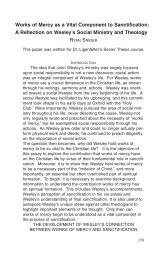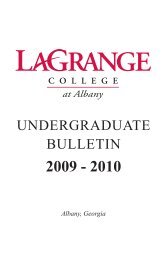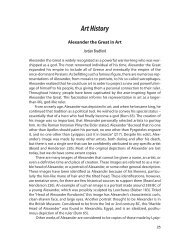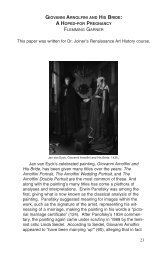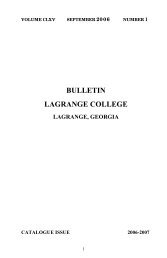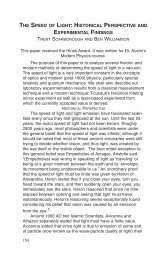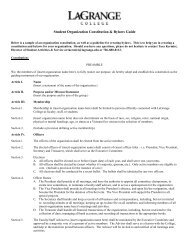undergraduate bulletin - LaGrange College
undergraduate bulletin - LaGrange College
undergraduate bulletin - LaGrange College
Create successful ePaper yourself
Turn your PDF publications into a flip-book with our unique Google optimized e-Paper software.
ehaviors may be experienced as intimidating or offensive, particularly when they recur or when<br />
one person has authority over another. Such behaviors may include but are not limited to<br />
unwelcome hugs or touching, inappropriate staring, veiled suggestions of sexual activity,<br />
requests for meetings in non-academic settings, and risqué jokes, stories, or images.<br />
Accusations of harassment that are made without good cause shall not be condoned. Such<br />
accusations are indeed grievous and can have damaging and far-reaching effects upon the careers<br />
and lives of individuals.<br />
Any member of the <strong>College</strong> community having a complaint of harassment may raise the matter<br />
informally or file a formal complaint. The informal process is an attempt to mediate between the<br />
parties in order to effect a mutually agreeable solution without entering into the formal hearing<br />
process.<br />
A. Informal Procedures<br />
The following informal procedures may be followed:<br />
Clearly say "no" to the person whose behavior is unwelcome.<br />
Communicate either orally or in writing with the person whose behavior is unwelcome.<br />
The most effective communication will have three elements:<br />
a factual description of the incident(s), including the time, place, date, and specific<br />
behavior,<br />
a description of the complainant's feelings, including any consequences of the incident,<br />
and<br />
a request that the conduct cease.<br />
Speak with a department chair, dean, director, counselor, or chaplain, who may speak to<br />
the person whose behavior is unwelcome. The name of the complainant need not be<br />
disclosed. The purpose of such conversation is the cessation of the unwelcome behavior.<br />
In the case of harassment of a student, it may be appropriate first to seek the advice of his<br />
or her advisor.<br />
B. Formal Procedures<br />
To initiate a formal grievance procedure, the complainant shall submit a written statement to the<br />
President of the <strong>College</strong>. The President, after such consultation as is deemed appropriate, will<br />
appoint a three-member Review Committee from among the membership of the Institutional<br />
Planning Council, the Provost‘s Council, or other <strong>College</strong> committees as the President deems<br />
appropriate. Members of the Review Committee will then meet to discuss the complaint. Unless<br />
the Committee concludes that the complaint is without merit, the parties to the dispute will be<br />
invited to appear before the Committee and to confront any adverse witnesses. The Committee<br />
may conduct its own inquiry, call witnesses, and gather whatever information it deems necessary<br />
to assist in reaching a determination as to the merits of the accusation. Once a determination has<br />
been reached, the Committee shall report its findings to the President of the <strong>College</strong>.<br />
36


